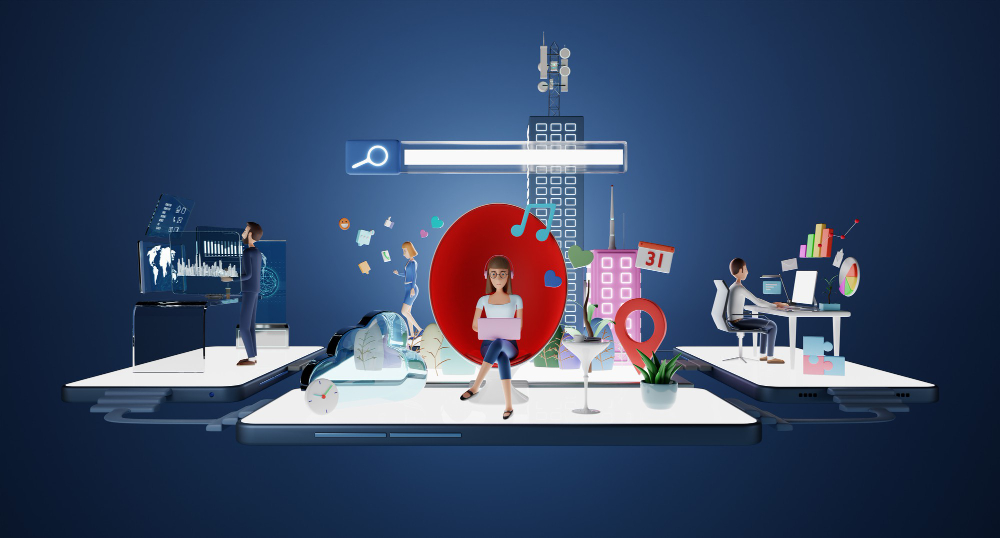
BMM is a brand and digital transformation consultancy.
T (+971) 50 438 2955
Email: wecare@localhost
Brown Men Marketing LLC
UAE (Dubai), India (New Delhi)
Impact of Artificial Intelligence in Digital Marketing
Artificial Intelligence in Digital Marketing
In recent days Artificial Intelligence has expanded into the mainstream but the quest for Technological Singularity has been bubbling for a long time since the advent of neural networks and machine learning while the obvious applications of AI have been debated since the invention of transistors almost a hundred years ago. People far smarter and well-researched than us have been speculating on the function of Artificial Intelligence since we began thinking.
The first concept of an intelligence machine created by us can be traced back to 3000 years ago during the time of Plato and Diogenes but was solidified by Marshall Mcluhan’s 1964 quote, “Man becomes the sex organs of the machine world.” This quote drives the notion that AI and the Machine World might be the evolutionary successors of humanity and basks upon our fear of being replaced and being done the same as we did to lesser species. The fear of AI taking over the world is a notion that has been debated upon till exhaustion and has been a very significant part of our culture as hundreds of books, tv shows, and movies have been made on this topic for decades.
But now that AI is finally coming out of the woodwork and its applications have been advancing exponentially, these fears and prophecies are stepping out of the realm of Science Fiction and coming into our real-world reality. However, these prophecies must be taken with a grain of salt as historically speaking, humans have been seriously bad at predicting the future, and predictions about AI have been nothing new. In truth, the world is way too complex for a single person or even the collective of humanity to get its predictions right.
The real world is filled with actions and their consequences that occur at a rate and a level that even our most complex algorithms powered by our most powerful quantum computers can’t predict right. Psychohistory is a myth and legend and even with the advent of AI might stay in the realm of fiction (Sorry Asimov fans). This is the reason why most AI experts aren’t sounding the alarm just yet. Instead, we are now in the phase of reaping the benefits of AI which is now digging itself into every possible industry under the Sun.
One of these avenues is Digital Marketing where AI is about to reshape the entire environment and disrupt the way we contemporarily conduct business. Everything from content creation, design, and social media marketing to website design and audit is about to be fully automated and conducted by A.I. The effects of this have already begun manifesting themselves in our media. Forbes claims that over 300 Million Jobs are going to be automated before this decade is through and we somewhat agree with this statement.
Here are a few aspects through which A.I. is making its way into Digital Marketing:
- Dynamic creative optimisation (DCO): Based on client information including demographics and hobbies, DCO technology can automatically create ad creatives in real time and help ad campaigns perform better.
- Chatbots: Chatbots that are AI-powered may offer tailored marketing messages and customer recommendations based on their previous behaviour and preferences. This can assist online marketers in designing a customised consumer experience.
- Predictive analytics: Using customer data analysis, AI can find patterns and trends that can be utilised to forecast future behaviour. This can help online marketers decide where to invest their money and how to best utilise their resources.
- Detection of anomalies: AI algorithms are capable of spotting out-of-the-ordinary data trends that can point to fraudulent behaviour in a marketing campaign. An AI-powered fraud detection system, for instance, can indicate a rapid increase in clicks or impressions from a specific region or device as perhaps fake.
- Machine translation: By automatically translating ad scripts from one language to another, machine translation technology driven by AI enables marketers to quickly generate advertising in several languages.
- Audience segmentation: Tools with AI-powered segmentation can automatically classify clients according to their traits. This can assist digital marketers in determining which features and advantages of a product are most significant to certain target segments.
- Real-time optimisation: AI systems are able to assess ad performance at the moment and modify targeting options to improve ad distribution. According to the time of day, the customer's location, or the device they use, an AI-powered system may, for instance, automatically change ad targeting.

Leveraging AI Tools in Digital Marketing: Best Practices and Considerations
The most well-liked AI tools for digital marketers include Hemingway Editor, Grammarly, Surfer SEO, Zapier, and Jasper. We advise you to adopt the following best practises when utilising AI tools:
Use AI in conjunction with human ideas and views since human intuition and creativity cannot be replaced by AI. Let's take the case where our team is developing a social media campaign to advertise a new product. We analyse data on the demographics, interests, and behaviour patterns of the client's target audience using AI algorithms.
Our team can utilise this research to determine the ideal times of day to post, the greatest channels to use, and the most effective messaging. Once we have this information, we apply our own skills and imagination to create engaging material for the audience.
Your aims and objectives will ultimately determine the best mix of humans and AI. Specifying the function of AI should be the main consideration. Establish which jobs will require human input and which will be handled by AI.
The project's difficulty will be assessed in the following phase. Identify the tasks that artificial intelligence may find difficult. The task's effect on the client or end user is another aspect to take into account. Although AI may be able to automate some customer interactions, some customers may still prefer to speak to a live person. While chatbots, for instance, can be helpful for answering straightforward customer care enquiries, customers might feel irate if they are unable to speak with a human for more complicated concerns. Before making decisions based on any data or insights supplied by AI tools, be sure to fact-check them. While AI can be effective and offer reliable insights, it is not perfect.
Lastly, refrain from over-automating jobs. While automation might save time, take cautious not to lose the personal touch.
Conclusion:
We believe the answer to the issue of whether AI will displace digital marketers is ‘no’. While AI can automate some jobs and procedures, it is unable to replace the creativity, insight, and distinctive viewpoint that each marketer brings to their profession.
Latest Blogs
- 22/01/2025in Digital Marketing, SEO Blogs
Brands that Made a Mark at Maha Kumbh
... - 17/01/2025in Digital Marketing, SEO Blogs
Marketing Strategy V/S Marketing Plan: The Basics
... - 09/01/2025in Digital Marketing, SEO Blogs
No Logo, No Marketing: Muji, The Anti-Brand Brand
... - 12/12/2024in Digital Marketing, SEO Blogs
Top Social Media Forecast in 2025
...
